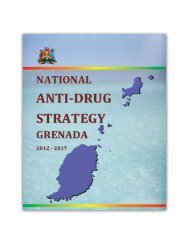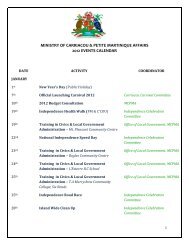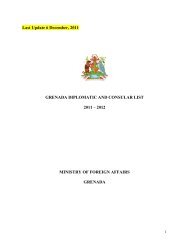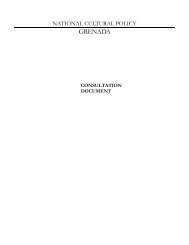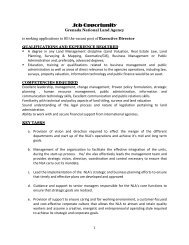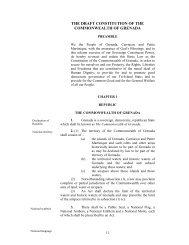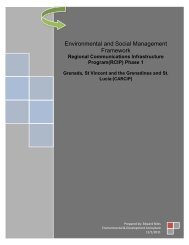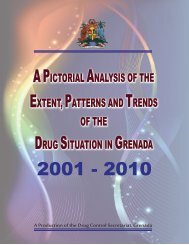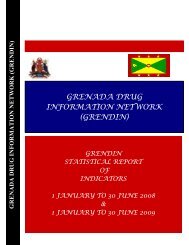Doing Business 2009 - Government of Grenada
Doing Business 2009 - Government of Grenada
Doing Business 2009 - Government of Grenada
You also want an ePaper? Increase the reach of your titles
YUMPU automatically turns print PDFs into web optimized ePapers that Google loves.
Albania<br />
Albania, a top reformer globally and regionally, established a public credit registry allowing financial<br />
institutions to share credit information and covering 8.3 percent <strong>of</strong> the adult population. This reform<br />
allows banks to better evaluate the creditworthiness <strong>of</strong> potential borrowers, facilitating access to credit<br />
for firms and individuals. Albania also strengthened investor protections. A new company law requires<br />
that disinterested shareholders approve transactions between interested parties and obligates those<br />
parties to disclose all information on the transaction to the public. The law also reinforces directors’<br />
duties and requires directors, when found liable, to pay damages and return pr<strong>of</strong>its to the company.<br />
Starting a business became easier with online publication, reduction <strong>of</strong> the registration cost, and the<br />
consolidation <strong>of</strong> tax, health insurance, and labor registration into a single application. The corporate<br />
income tax rate was reduced from 20 percent to 10 percent effective January 1, 2008.<br />
Antigua and Barbuda Antigua and Barbuda reduced its corporate income tax rate from 30% to 25%.<br />
Azerbaijan<br />
Azerbaijan, the top reformer globally and regionally, eliminated the minimum threshold for reporting<br />
loans to the public credit registry in September 2007. The public registry now records information on<br />
all loans made by the financial system, more than doubling the coverage <strong>of</strong> borrowers with a credit<br />
history. Substantial amendments to the labor code in May 2007 made hiring workers easier by allowing<br />
employers to use fixed-term contracts for permanent tasks, easing restrictions on night work, and<br />
reducing requirements for redundancy dismissals. Azerbaijan created a second commercial court in<br />
Baku, increasing the number <strong>of</strong> judges dealing with commercial cases from five to nine. The average<br />
time to enforce a contract through the courts fell from 267 days to 237. A new law strengthens investor<br />
protections by requiring that transactions between interested parties be approved by shareholders.<br />
Interested parties are allowed to vote on the matter. Other provisions protect investors because directors<br />
who are held liable must pay damages and disgorge pr<strong>of</strong>its. Azerbaijan introduced a new unified<br />
property registry, reducing the number <strong>of</strong> procedures required to register property from seven to four.<br />
In addition, the State Register Service introduced the option <strong>of</strong> expediting two <strong>of</strong> the four procedures,<br />
making it possible to register property in 11 days. Similarly, the country created a one-stop shop for<br />
company registration, cutting the number <strong>of</strong> procedures from 13 to six and reducing the time required<br />
by half. Azerbaijan reduced the tax burden by introducing an online filing and payment system with<br />
advanced accounting s<strong>of</strong>tware for calculating taxes due. This saves more than 500 hours a year on<br />
average in dealing with paperwork.<br />
Belarus In Belarus, a top reformer globally and regionally, the public credit registry expanded credit<br />
information by eliminating the minimum threshold for loans recorded in its database. It also guaranteed<br />
the right <strong>of</strong> borrowers to review their data, improving accuracy. Starting a business became easier: a<br />
unified registry database was created, a time limit was introduced for registration, and the minimum<br />
capital requirement was cut by half. Belarus created a one-stop shop for property registration and<br />
introduced a broad administrative simplification program that set strict time limits at the registry and<br />
computerized its records. As a result, the time required to register property in Minsk fell from 231 days<br />
to 21. The time required for dealing with construction permits fell by 140 days, thanks to new statutory<br />
time limits for preapproval clearances and building permits. Belarus eased the tax burden by abolishing<br />
the “Chernobyl tax” (3 percent) and unemployment tax (1 percent) and amending the simplified tax<br />
system for small businesses. A new customs code and new banking regulations reduced the time to<br />
export<br />
Botswana Botswana improved its business environment by speeding the start-up process through<br />
computerization. A similar effort, which included training customs <strong>of</strong>ficers in using an electronic data<br />
interchange system, sped the processing <strong>of</strong> trade documents and reduced the time to export by two days<br />
and the time to import by a day. A new Company Act has come into force, requiring that shareholders<br />
approve related-party transactions and that directors repay damages and surrender pr<strong>of</strong>its if held liable.<br />
Finally, since January 2008, companies have been required to pay 0.2 percent <strong>of</strong> turnover for the<br />
training <strong>of</strong> workers.<br />
49



